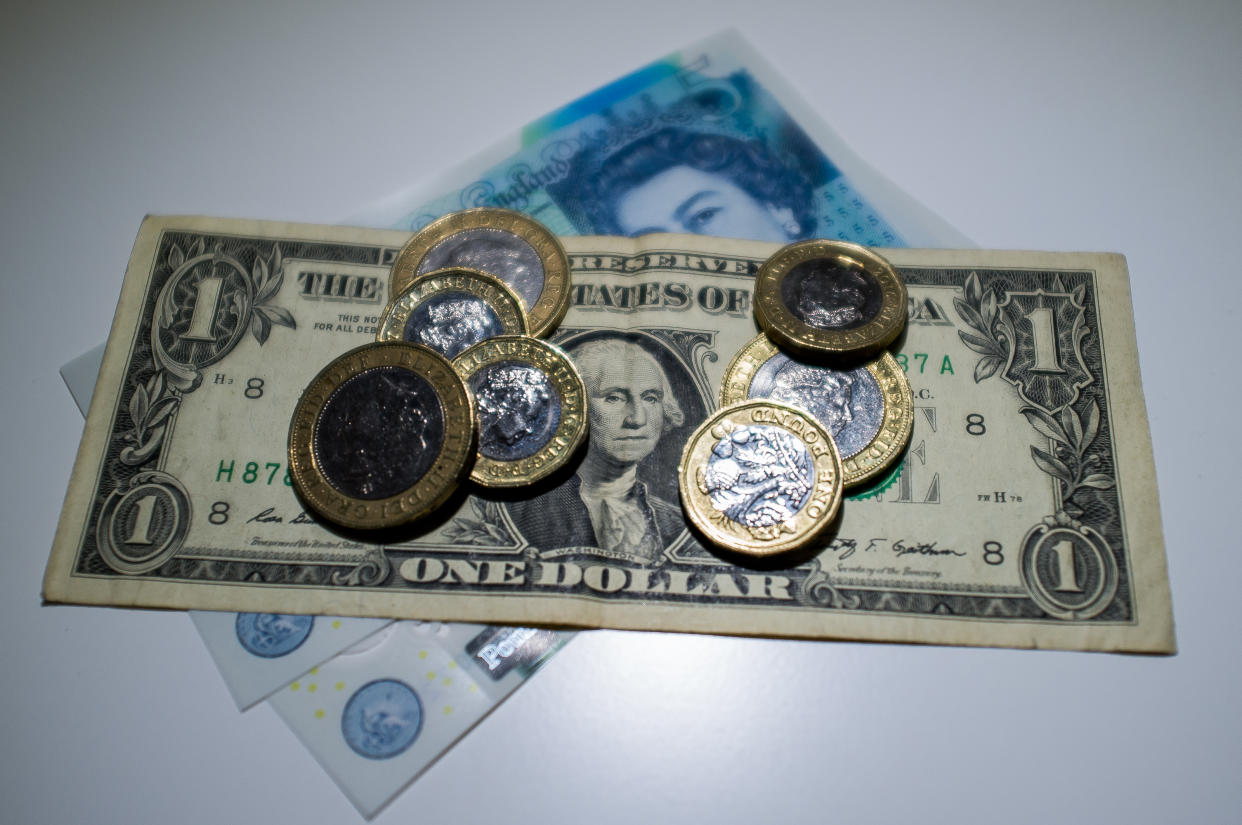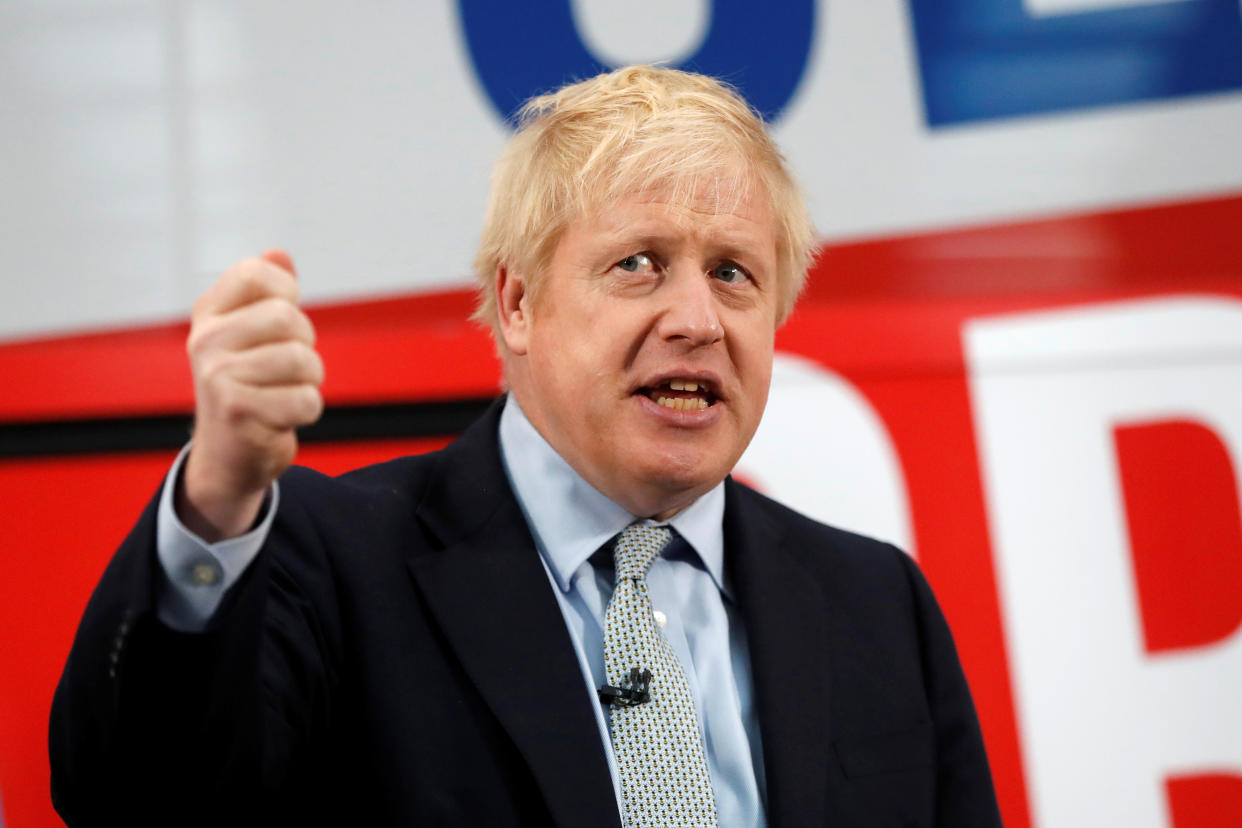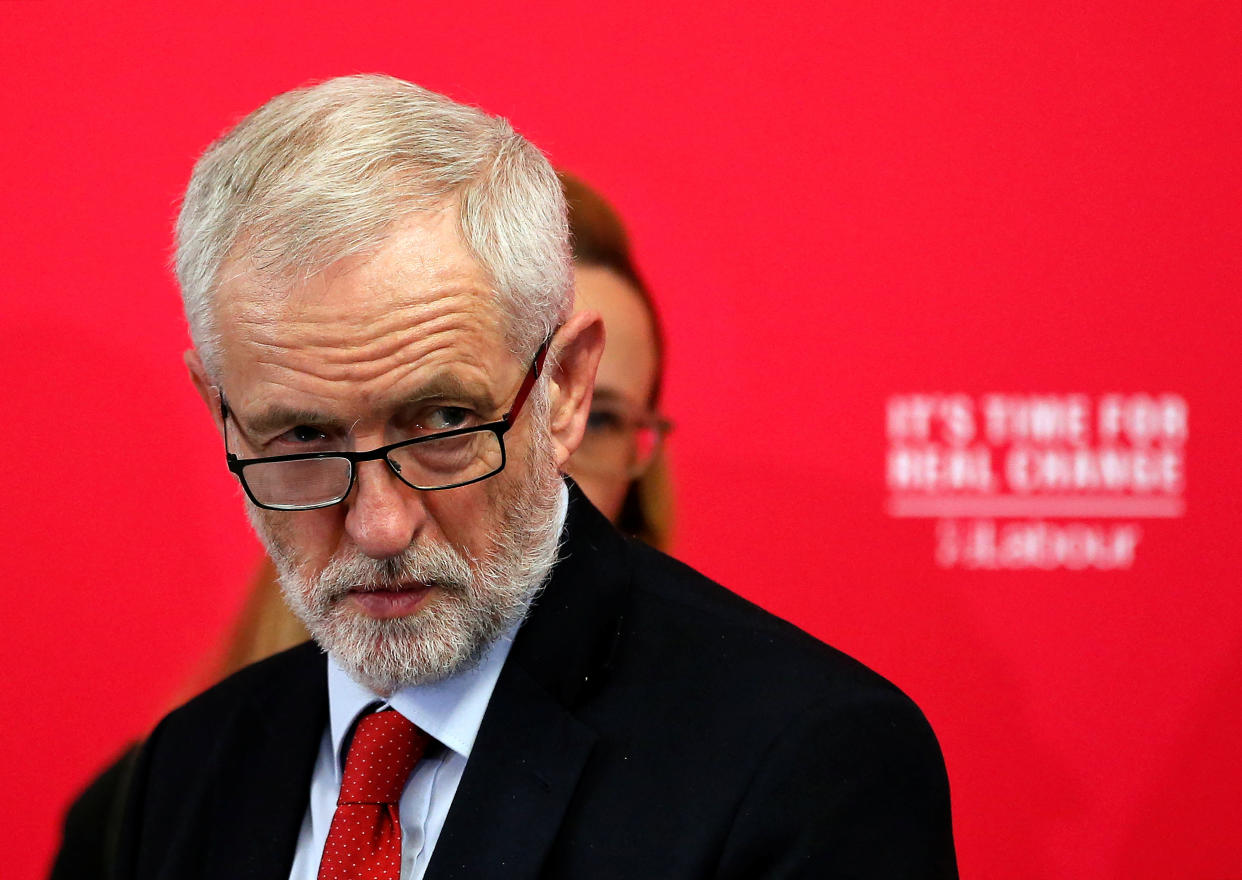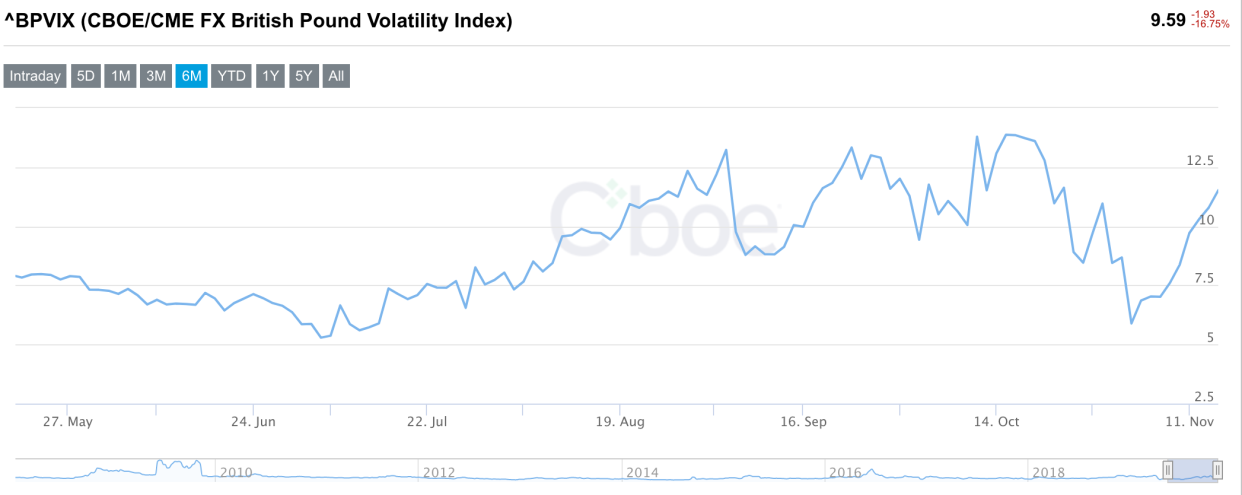What the general election could mean for the pound
December’s general election could prove decisive to Brexit — but what will it mean for the pound?
Brexit has been the key driver of the UK exchange rate ever since the 2016 referendum and investors are closely watching the December 12 vote for cues.
“We’re waiting for the election to get some sort of a game plan for the next few years,” UBS strategist Lefteris Farmakis told Yahoo Finance UK.
Usually traders take positions ahead of an election based on what they think the outcome will be — buy the rumour, sell the news. However, with an unusually high amount of uncertainty about, investment banks are recommending clients sit on the sidelines for this one.
JP Morgan called forecasting the pound a “fool’s errand” right now and Goldman Sachs recently ended its recommendation to hold sterling, citing election uncertainty. Deutsche Bank’s Oliver Harvey said “confident predictions” are “close to impossible.”

The wariness comes from the surprise result of the 2017 election, the unpredictable way Brexit has driven voting, the unusual winter timing of the ballot, and the emergence of Nigel Farage’s wildcard Brexit Party.
The eventual election outcome could provoke sizeable moves in the UK exchange rate as investors quickly shift cash to reflect the new reality.
While analysts are reluctant to make firm predictions on the outcome, they have made broad predictions about what certain outcomes might mean for the trajectory of sterling.
Here’s what the City expects:
Conservative victory — Sterling could hit $1.35

“I think largely everyone’s expecting that the Tory’s should get their majority,” John Goldie, a foreign exchange strategist at currency broker Argentex (AGFX.L), told Yahoo Finance UK. “I do see that as being broadly sterling positive. It’s progress, it’s development, it’s movement forward.”
A solid Tory majority would lead to “a smoother path for Brexit-related legislation (and more coherent policymaking in general),” Goldman Sachs analyst Zach Pandl wrote in a recent note.
Boris Johnson’s Brexit deal has already been approved in principle by the House of Commons and winning a majority would allow him to get it passed into law, finally moving Brexit onto the next stage of negotiations.
A solid majority would also allow Boris to overrule the hard Eurosceptic wing of his party, the European Research Group (ERG). The ERG favour a hard Brexit but strategists believe Johnson would pursue a closer partnership with the EU if given enough breathing room.
Analysts at ING said the pound could reach $1.33 against the dollar if the Conservatives win a large majority, a surge of almost 4% on today’s price of around $1.28.
Goldie put the ceiling as high as $1.35 if Johnson wins a majority of more than 30.
UBS’s Farmakis takes a more cautious view.
“I don’t think you get lots of upside from here,” he said of a Tory majority. “I think most of the move is behind us.”
Size matters — Slim victory could see pound fall

The exact number of seats the Tories win will be closely watched — and a slim majority could actually push the pound lower.
JP Morgan analysts Paul Meggyesi and Daniel Hui wrote in a recent note that a weak majority for the Conservatives would be among the worst election outcomes.
Under Johnson’s proposed withdrawal deal, the UK and EU have until December 2020 to negotiate a new trade agreement. They can extend the timetable in summer 2020 if not enough progress has been made by then.
Without a strong majority, hard Eurosceptics are likely to push Johnson to let the UK crash out of the EU without a deal in December 2020, which would be disastrous for the UK economy. No deal Brexit would be back on the table.
ING disagrees with JP Morgan and said the pound would still rise if the Tory’s win a slim majority. But the Dutch bank thinks sterling would only climb to $1.31 against the dollar.
“The initial reaction would be sterling positive but very quickly it would dawn on people that it’s still going to be very difficult to carry this process out,” Goldie said.
Labour victory — $1.50 for minority government, $1.22 for full majority

You might instinctively think a Labour victory would be bad for the pound. The Party’s manifesto is expected to be one of the most far left in recent history. Business groups and think tanks have warned that a Labour government would be disastrous for the economy.
However, many analysts think Labour could actually be good for sterling — at least in certain circumstances.
ING said the pound could rise as high as $1.38 against the dollar if Labour wins a slim majority — higher than the bank’s forecast for a Tory win.
Why? Labour supports a second referendum.
“A Labour minority government probably on balance would be net positive for sterling,” JP Morgan research strategist Paul Meggysei told Yahoo Finance UK.
The cross-party support for a second referendum means parliament are likely to approve another ballot on Brexit. This opens the possible cancelling of Brexit, which investors and analysts see as the most positive outcome for the UK economy.
“You’d likely get a combination of a softer Brexit, indeed maybe no Brexit, with Corbyn’s most radical instincts being constrained by the need to keep his coalition partners on board,” Meggyesi said.
UBS’ Farmakis said sterling could rise as high as $1.50 against the dollar in a “a best case scenario” where Brexit is reversed and domestic policy continues as normal.

Even if Labour win out-right there could be a bounce, Argentex’s Goldie said.
“If we got a Labour majority there would still be progress,” he said. “They’ve been quite explicit that they would negotiate for six months and then put it to the people.”
However, not everyone agrees. ING see the pound falling around 4.5% to $1.22 if Labour wins a large majority.
JP Morgan is also sceptical.
“The questions foreign investors will ask around policies such as Labour’s potential nationalisation of certain industries or businesses — those would weigh heavily,” Meggyesi said.
With enough MPs, Labour would be free to pursue its most radical policies — including re-nationalising rail, mail, broadband, and water.
“Clearly a Labour majority introduces uncertainty on domestic economic policies,” UBS’ Farmakis said. “That’s probably going to weigh on sterling.”
Hung parliament — Sterling drops to $1.20
Perhaps the worst outcome for the pound is a hung parliament.
“No majority is potentially the bigger risk for the pound,” Goldie said. “If there’s no majority, whoever is PM will have difficulty getting their manifesto through parliament. We’d essentially be in the same position as we are now”
A hung parliament would mean Britain would remains stuck in the quagmire that has gummed up British politics since the 2016 referendum, with no clear sight on the next steps. Goldie expects the pound to drop to $1.25 — “maybe even below” — if there is no clear victor.
ING is even more pessimistic, saying the pound could fall to $1.20 — a drop of more than 6% from current levels — if we end up with a hung parliament.
“In the short-term, this is probably the worst scenario for the economy,” ING’s team of economists and strategists wrote. “‘No deal’ fears return, and with a divided Parliament, progress on Brexit and other domestic issues would grind to a halt.”
Once again, not everyone agrees. JP Morgan thinks a hung parliament “would be modestly positive” for the pound.
“The risk of a hard Brexit under any form of hung parliament would collapse to zero, whereas the risk of a second referendum, and hence no Brexit, would rise,” Hui and Meggysei wrote in their recent note.
Expect volatility
What this all amounts to is a lot of uncertainty that could mean big price swings for the pound.
“In the lead up to the election, we’re in the hands of the polls,” Goldie said.
Sterling has traded in a range of about 1% against both the euro and the dollar over the last month, with markets pricing in a Tory majority.
But if polls start to show Labour gaining ground then the pound could start to fall. Investors are particularly sensitive given the experience of the 2017 election, when Theresa May blew a decisive lead in opinion polls after calling a snap election.
“Everyone’s so cynical about what the polls show, given what we’ve seen over the last few years,” John Goldie
The British Pound Volatility index (^BPVIX), produced by derivatives trading venues CME and CBOE, has risen sharply since the start of the month and now stands at almost double the level it was at in early summer. The index measures traders’ expectations of future price swings for sterling.

The election result could also spark price swings for sterling.
“Depending on the outcome, there will be some volatility,” said UBS’ Farmakis. “The more the uncertainty introduced by the result, the higher the volatility. A decent performance by Labour arguably introduces more uncertainty than say a good performance by the Tories.”
But it remains to be seen if any of the price moves stick.
“In my mind it’s quite short-term,” Goldie said. “I’m wary of assuming that a move positive for sterling is the start of a trend. Ultimately we realise that if we do get the deal through, this is still just the first step.”
JP Morgan wrote to clients at the start of the month: “Not surprisingly we see no basis on which to make any outright trade recommendations in GBP at present.”
————
Oscar Williams-Grut is Yahoo Finance UK’s City correspondent. He covers banking, fintech, and finance for Yahoo Finance UK. Follow him on Twitter at @OscarWGrut.
Read more:


